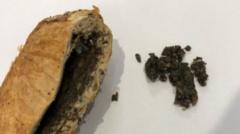Graphic photographs from the contentious murder trial involving Erin Patterson, a 50-year-old Australian woman, have been disclosed following her conviction for the fatal poisoning of three relatives during a meal. The incident occurred on July 29, 2023, in Morwell, a small town in Victoria. Patterson was found guilty of the murders and the attempted murder of a fourth family member, who narrowly escaped the deadly fate suffered by others.
The prosecution's case detailed how Patterson allegedly foraged for the lethal death cap mushrooms, which led to the tragic poisoning. It was revealed that after the meal, witnessed by the entire family, three individuals, including Patterson's former in-laws, Don and Gail Patterson, both aged 70, and Gail's sister, Heather Wilkinson, aged 66, succumbed to their illnesses in the hospital. Ian Wilkinson, Heather's husband, survived the ordeal but remained hospitalized for several weeks.
Following her conviction, the Supreme Court of Victoria released nearly 100 images presented to the jury during the trial. Among the most chilling were photographs of the Beef Wellington leftovers, which were meticulously collected to prevent contamination for lab analysis. These remnants were later tested for traces of the dangerous mushrooms.
Death cap mushrooms, known for their lethal toxic properties, are often responsible for the majority of mushroom-related fatalities globally. Their caps can range from greenish-yellow to brown, and they can cause severe poisoning, with even a minuscule amount resulting in death.
Patterson claimed she purchased the mushrooms from an Asian grocery store in Melbourne but failed to provide specific details when questioned about the transaction. Investigators found evidence showing she had searched for death cap mushroom sightings in her area on an online platform prior to the meal.
Detectives also located her mobile history, which indicated that Patterson had visited locations notorious for mushroom sightings and purchased a food dehydrator shortly after. Images recovered from her mobile displayed what looked like death cap mushrooms on kitchen scales.
Furthermore, traces of the poisonous mushrooms were found in a food dehydrator that Patterson discarded in a dump shortly after the meal. While she initially claimed to have never owned such an appliance, evidence contradicted her statement, including a manual found in her drawer and discussions about its use in a true crime Facebook group.
Ultimately, Patterson sought medical help two days after the meal, insisting that she felt ill, while refusing immediate assessment for her children, whom she claimed had also eaten the leftovers. However, none of their medical tests indicated mushroom poisoning.
The disturbing evidence presented throughout this trial has left a lasting impression on the public and serves as a poignant reminder of the dangers posed by foraged foods.



















